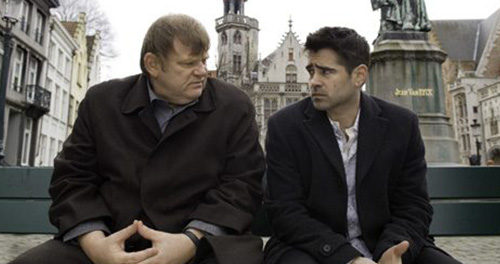In Bruges (2008)
[8]
Writer/director Martin McDonagh (Three Billboards Outside Ebbing Missouri) explores the human side of hit-men in his darkly comic, occasionally horrific feature film debut. Colin Farrell and Brendan Gleeson star as hired guns waiting in idyllic Bruges, Belgium, for their next assignment. Farrell’s character is reeling from accidentally killing a child in his last assignment. He hates Bruges and bickers with Gleeson’s character, who is happy to sightsee and take in the surroundings. But when Gleeson is finally told by their boss (Ralph Fiennes) to off Farrell’s character, both men have crises of conscience that make for a complicated third act.
Gleeson is always a reliable performer, but Farrell is hit and miss (no pun intended). Luckily, he’s the right fit for this role, balancing goofy humor with remorse, and toughness with vulnerability in what might be his strongest performance to date. The two men carry the film remarkably well. But the writing is the real star here. McDonagh succeeds in making a ‘tough guy’ movie without any actual tough guys in it. It’s one of few gangster/mobster/hitmen movies that feature human beings as characters instead of two-dimensional stereotypes. It’s refreshing to see male archetypes deconstructed, crying about guilt and talking each other out of suicide.
There’s a scene in which Fiennes’ character is forced to come to town and punish Gleeson. The two men meet at a cafe and then head to a bell tower where they’re going to have a shoot-out. But Gleeson turns the scene on its head when he refuses to fight or defend himself. Fiennes is left in the awkward position of having to shoot Gleeson point-blank, with no etiquette or protocol to hide his feelings behind. And he can’t do it. That’s really what In Bruges is all about — breaking down the barriers that enable and encourage men to commit unspeakable acts.
Oscar Nomination: Best Original Screenplay


